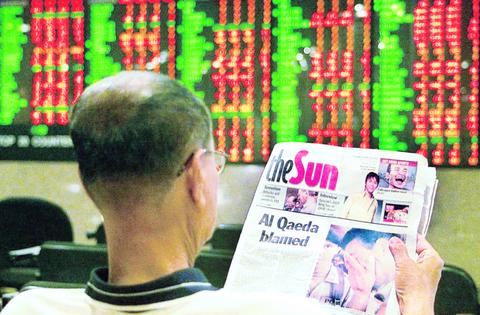The Malaysian tourism office in Taiwan yesterday tried to drum up local interest in traveling to Malaysia by offering a US$10,000 lucky draw for shopping and other cash rewards to Taiwan outbound travelers.
The initiative comes just days after the deadly terrorist attack in Bali, Indonesia, that killed over 180 people.
Michael Tay, director of Tourism Malaysia in Taiwan admitted that tourists may be afraid of traveling to Southeast Asia after Saturday's attack.

PHOTO: AP
"But Malaysia is different from Indonesia and is composed of three different ethnic groups, including Malays, Chinese and Indians. The Muslims in Malaysia are not radical and they pose no danger to tourists," Tay said. "The Malaysia Government will definitely protect the safety of the tourists. After all, the government gains big economic benefits from the 12 million tourists that visit the nation annually."
To rebuild confidence and solicit visitors, the Tourism Malaysia yesterday launched its "Malaysia Carnival Competition," with give-aways gift items, including crystal ornament and dolls, to the tourists visiting the country.
Eligible contestants are the travelers who make trips to Malaysia from Taiwan between Oct. 15, 2002 and Jan. 15, 2003.
The winner of the US$10,000 shopping spree will be announced following a lucky draw on Jan. 24, 2003. Ironically, the winner will have to purchase another ticket to Malaysia to use the cash.
Tourism Malaysia has also aligned with nine travel agencies in Taiwan to offer three NT$20,000 shopping spree lucky draws at Taipei's Pacific Sogo Department Store -- one per month -- to group travelers for the next three months.
To enter the lucky draw, eligible contestants are requested to prove that they have made trips to Malaysia during the three-month period by submitting passport copies stamped by Malaysian customs and airplane ticket stubs.
Malaysia is a good alternative travel destination to Bali, Tay said. Malaysia's islands, which have topical scenery similar to Bali's beaches, are a viable alternative for travelers, he said.

To many, Tatu City on the outskirts of Nairobi looks like a success. The first city entirely built by a private company to be operational in east Africa, with about 25,000 people living and working there, it accounts for about two-thirds of all foreign investment in Kenya. Its low-tax status has attracted more than 100 businesses including Heineken, coffee brand Dormans, and the biggest call-center and cold-chain transport firms in the region. However, to some local politicians, Tatu City has looked more like a target for extortion. A parade of governors have demanded land worth millions of dollars in exchange

An Indonesian animated movie is smashing regional box office records and could be set for wider success as it prepares to open beyond the Southeast Asian archipelago’s silver screens. Jumbo — a film based on the adventures of main character, Don, a large orphaned Indonesian boy facing bullying at school — last month became the highest-grossing Southeast Asian animated film, raking in more than US$8 million. Released at the end of March to coincide with the Eid holidays after the Islamic fasting month of Ramadan, the movie has hit 8 million ticket sales, the third-highest in Indonesian cinema history, Film

Taiwan Semiconductor Manufacturing Co’s (TSMC, 台積電) revenue jumped 48 percent last month, underscoring how electronics firms scrambled to acquire essential components before global tariffs took effect. The main chipmaker for Apple Inc and Nvidia Corp reported monthly sales of NT$349.6 billion (US$11.6 billion). That compares with the average analysts’ estimate for a 38 percent rise in second-quarter revenue. US President Donald Trump’s trade war is prompting economists to retool GDP forecasts worldwide, casting doubt over the outlook for everything from iPhone demand to computing and datacenter construction. However, TSMC — a barometer for global tech spending given its central role in the

Alchip Technologies Ltd (世芯), an application-specific integrated circuit (ASIC) designer specializing in server chips, expects revenue to decline this year due to sagging demand for 5-nanometer artificial intelligence (AI) chips from a North America-based major customer, a company executive said yesterday. That would be the first contraction in revenue for Alchip as it has been enjoying strong revenue growth over the past few years, benefiting from cloud-service providers’ moves to reduce dependence on Nvidia Corp’s expensive AI chips by building their own AI accelerator by outsourcing chip design. The 5-nanometer chip was supposed to be a new growth engine as the lifecycle